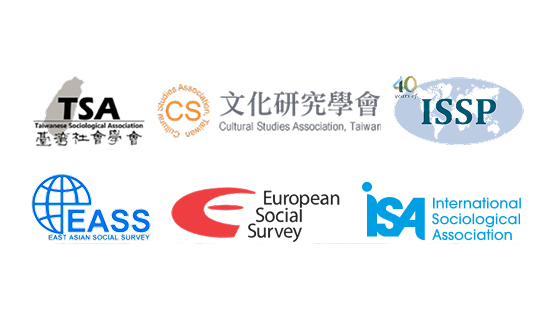Taiwan Social Change Survey(TSCS) is a time-series survey conducted every five years, inviting scholars from disciplines such as political science, sociology, cultural studies, and psychology to participate. Through international collaborations, the TSCS facilitates connections between Taiwan and the global academic community. Guided by the belief that academic databases are public assets, TSCS provides the academic community with high-quality, nationally representative data for research purposes.
Witness Every Moment of Change in Taiwanese Society
The Department of Humanities and Social Science of the National Science and Technology Council was established in 1983 ; it was executed by the Institute of Sociology at Academia Sinica. The purpose of the survey is to collect nationally representative data to understand the long-term trends of social change in Taiwan. The survey covers various aspects, including family, education, social class, political culture, elections, communication, and religion. Conducted every five years, it allows for longitudinal studies and comparative analyses across multiple time points. Since 1984, a total of 72 probability sampling surveys have been completed in Taiwan, interviewing approximately 146,000 individuals, making it one of the largest comprehensive social surveys in the world.
Data Open
2023 Taiwan Social Change Survey (Round 8, Year 4): National Identity and Citizenship
The fourth survey of the eighth phase was divided into two main themes. The first theme, National Identity and Citizenship, continued from the fourth and fifth waves (2013 and 2014) of the previous surveys. It aimed to explore the evolving concepts of national identity and citizenship. Additionally, this survey incorporated questions from the 2023 International Social Survey Programme (ISSP) on National Identity and Citizenship. A total of 1,563 valid questionnaires were successfully completed for this survey.
Online Statistical AnalysisSurvey DataSurvey Data
Our Features
The database is organized in five-year cycles, with repeated surveys conducted on the same themes. Most topics are scheduled for investigation every five years, using consistent questionnaires to collect data. This approach enables systematic documentation of changes across various aspects of Taiwanese society—such as politics, economics, and culture—over time.
Longitudinal studies of social change allow for the capture of temporal dynamics and support comparative analysis across multiple time points. By steadily accumulating data over several decades, the database provides a robust foundation for academic research, facilitating in-depth analysis of Taiwan’s evolving social landscape. It also serves as a vital empirical record for the social sciences and a key reference for scholarly analysis and public policy formulation.

Social phenomena are closely interconnected, and capturing the full scope of social change in Taiwan requires interdisciplinary collaboration within the social sciences. To this end, scholars from diverse fields—including sociology, economics, political science, psychology, anthropology, education, communication, law, and psychiatry—are invited to participate, fostering a model of cross-disciplinary cooperation.
For each wave of thematic surveys, experts from relevant disciplines contribute to the questionnaire design, ensuring that the questions comprehensively and accurately reflect the dynamics of social change. This collaborative approach enhances the breadth and precision of the surveys, increases the integrative value of the research, and promotes the advancement of academic inquiry. Over the years, numerous researchers have drawn on the survey data to produce scholarly work, resulting in over 2,000 academic publications across various fields.

Taiwan has participated in the International Social Survey Programme (ISSP) since 2002, conducting annual surveys alongside over 40 countries. In 2006, it also joined the East Asian Social Survey (EASS) as a founding member, carrying out biennial cross-national surveys with regional partners.
These international collaborations strengthen Taiwan’s ties to the global research community, expand scholars’ international perspectives, and promote academic exchange. They also provide essential data for comparative studies, helping to place Taiwan’s social changes in a broader global context.

How We Conduct Surveys

Research on social change requires time-series data and longitudinal surveys. By collecting data from two or more points in time, researchers can conduct comparative analyses to identify trends in social transformation. Most survey topics are scheduled every five years, striking a balance between tracking meaningful change and avoiding intervals too short to capture significant societal transformations.

Since 2015, the "Address-Based Sampling (ABS)" method has been piloted, marking the first survey in Taiwan to adopt this approach. The aim is to assess the feasibility of using address and location data from the Ministry of the Interior’s household registration system for sampling. In response to the implementation of the Personal Information Protection Act, which imposed restrictions on the use of household registration data by the Ministry of the Interior’s Household Registration Office, the sampling method was officially switched from household registration data to address-based sampling starting from the eighth round, first year (2020), with the resident population as the target population.

Interviewers conduct face-to-face interviews using tablets and the Computer Assisted Personal Interviewing (CAPI) system, collecting firsthand data from all regions of Taiwan. Completed data is immediately transmitted back through the system, and the project team conducts regular data verification at set intervals. The results are provided to field interviewers as reference, helping to promptly correct errors and misconceptions, thereby improving data quality and efficiency.

Research Resources
In addition to the TSCS, sociological research resources are widely distributed across government initiatives, academic organizations, and research institutions. These resources are a valuable foundation for scholarly inquiry and public policy development. They not only enrich researchers’ data pools but also foster interdisciplinary collaboration, enabling the exploration of a broader range of social issues and a deeper understanding of Taiwan’s diverse society. Moreover, they offer opportunities to expand international comparative studies and gain insights into global trends.
Read More
